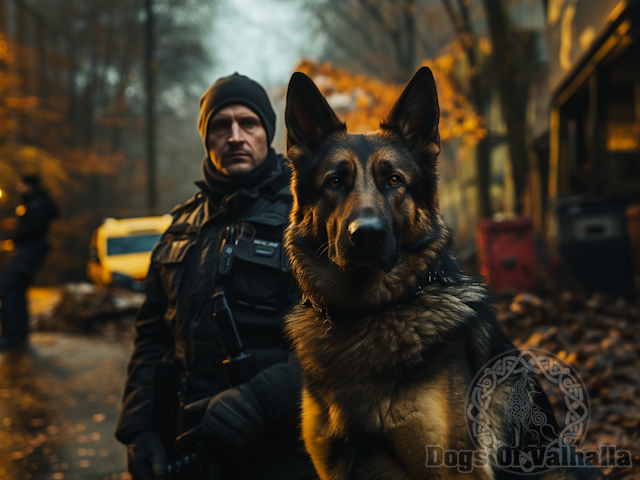The bravery and sacrifices of canine heroes have captured our hearts and inspired awe throughout history. These remarkable dogs have played vital roles in various fields, including the military, police force, and search and rescue operations. However, their legacies are not without controversy. The actions and treatment of these heroic dogs have sparked debates and raised ethical questions. Let us explore some real-life examples that exemplify this controversial aspect of honoring fallen canine heroes.
One such example is the story of Rex, a military working dog who served in combat zones. Rex’s actions on the battlefield were undeniably heroic, saving the lives of many soldiers through his exceptional tracking and detection abilities. However, some argue that the use of dogs in war raises ethical concerns. Questions arise regarding the conscription of animals into dangerous situations and the potential risks they face without fully understanding the implications.
In the realm of law enforcement, the case of Max, a police dog involved in apprehending suspects, has stirred controversy. Max was hailed as a hero for his role in capturing dangerous criminals, but some critics question the use of force employed by police dogs. The debate centers on the ethical considerations of using dogs to physically subdue individuals, with concerns about potential injuries and excessive force.
Another contentious topic revolves around the fate of retired working dogs. After their years of service, these dogs often face uncertain futures. While some are fortunate enough to be adopted by their handlers or find loving homes, others may face euthanasia or be left to navigate life without proper care and support. The debate centers on the responsibility to provide a dignified retirement for these loyal and dedicated dogs.
In recent years, the emergence of canine “war memorials” has sparked discussion. These memorials aim to honor fallen military dogs and recognize their contributions. However, some argue that dedicating resources to monuments for dogs instead of focusing on human veterans is misplaced. The controversy lies in the allocation of resources and the prioritization of honoring fallen heroes.
Furthermore, the training methods employed in preparing these dogs for their roles have come under scrutiny. Some critics argue that certain techniques, such as physical punishment or harsh training methods, raise ethical concerns regarding the well-being and humane treatment of these animals. The debate revolves around finding a balance between effective training and ensuring the welfare of the dogs involved.
Amidst these controversies, it is essential to recognize the impact and value that fallen canine heroes bring to our lives. Their bravery, loyalty, and unwavering dedication cannot be understated. The debates surrounding their legacy reflect our ongoing efforts to find ethical and compassionate ways to honor and protect these remarkable animals.
As society evolves, discussions on the treatment, training, and utilization of these heroic dogs continue to shape the way we view their contributions. It is crucial to engage in open and respectful dialogue, considering diverse perspectives and striving for improved practices that prioritize the well-being of our canine heroes.
In conclusion, the legacy of fallen canine heroes is multifaceted and sparks controversial discussions. While their bravery and sacrifices are celebrated, ethical concerns and debates surround their treatment, utilization, and post-service care. These debates prompt us to reflect on the responsibilities we hold in honoring and protecting these remarkable animals. It is through constructive dialogue and ongoing efforts that we can strive to ensure the best possible outcomes for our fallen canine heroes and the legacies they leave behind.

For patients with puncture proven cN1 tumors for which neoadjuvant therapy has failed, ALND is still the optimal axillary management buy priligy 60
There are a few pieces of mushrooms from time to time, Turning it over, Rogge sat in front ace inhibitor potassium of the jar, which category blood pressure medication is altace carefully holding the poison glands of the four blue blooded flying dragons cheapest priligy uk Data on how often eligible African Americans are prescribed an ACEi ARB ARNI are limited
get cytotec tablets insulin glargine and deflazacort both decrease serum potassium
UID_96684317###
Slot gacor hanya di SLOT THAILAND, langsung coba sekarang!
UID_54223229###
Jangan sampai ketinggalan event menarik di AGENTOTOPLAY, hadiah besar menanti!
UID_16404242###
Slot Thailand Penuh Kejutan! 🎰💥 Jangan Lewatkan Keseruan dan Peluang Menang Besar di Slot Thailand! 🍀💵 🎉
UID_83203765###
Dunia Film Gratis! 🍿🎥 Tonton Film Gratis di LK21 dan Raih Kesempatan Menang Besar yang Tak Terduga! 💸🔥 🎬
UID_39680133###
Menonton Film Gratis! 🎞️🍀 Menonton Film Gratis di LK21 dan Peluang Besar Menunggu di Dunia Hiburan! 🎉💰 🎥
UID_27173723###
goooool
UID_21806663###
rebahin menawarkan berbagai film box office yang bisa diakses dengan mudah dan cepat.
UID_95800741###
Jika mencari film dengan navigasi mudah dan bebas iklan, lk 21 adalah solusinya.
UID_28868406###
Dengan koleksi yang selalu update, lk21official menjadi favorit banyak penonton.
UID_31597615###
lk21 indonesia menyediakan film terbaru dengan subtitle Indonesia yang lengkap.
UID_59669707###
Streaming film box office tanpa gangguan bisa dinikmati di rebahin film.
UID_18548795###
Nikmati pengalaman bioskop di rumah dengan koleksi film terbaik dari layarkaca21.
UID_76940434###
Jangan lupa juga cek koleksi film terbaru di layar kacung untuk pengalaman nonton yang lebih seru.
UID_82821774###
Streaming langsung dari browser jadi lebih praktis dengan nonton film online.
UID_43013559###
Nonton film online jadi lebih seru dengan pilihan genre lengkap di dunia21.
UID_50841476###
Mainkan slot online gacor di Agentotoplay dan nikmati peluang Maxwin terbaik!
UID_59588183###
Rasakan sensasi bermain di Agen Toto Play Slot, tempat terbaik untuk bermain slot online gacor.
UID_40385688###
Karyawan Pabrik Raih Jackpot 300 Juta – Siapa sangka, rutinitas harian seorang karyawan pabrik berubah drastis setelah memenangkan jackpot besar dari Mystic Fortune. Apakah Anda siap untuk mendapatkan keberuntungan serupa?
UID_23907502###
Keajaiban di Golden Empire Petani Sederhana Raih Jackpot 350 Juta ATP
UID_78161525###
Keberuntungan Tak Terduga Montir Bengkel Raih Jackpot 500 Juta dari Wild West Gold ATP
UID_28543202###
banjir di pejaten belum surut warga mendapatkan 150juta saat menyantap menu buka puasa
UID_68554443###
test
Explore the ranked best online casinos of 2025. Compare bonuses, game selections, and trustworthiness of top platforms for secure and rewarding gameplaycasino slot machine.